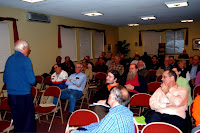
GRAND RAPIDS, MICHIGAN (April 8, 2009)--Princeton. Yale. Harvard. MIT. Carnegie Melon. Johns Hopkins. A valedictorian of even the most prestigious high school would covet an acceptance letter from one of these institutions.
At the Harlem Children’s Zone, the Gems HeadStart program’s classrooms are named after such schools, an effort to instill in children the belief that they can indeed reach the sky’s limits in education and in life.
Don Cooney, professor of Social Work and city commissioner of Kalamazoo, highlighted Geoffrey Canada’s Harlem Children’s Zone (HCZ) in a lecture at the Micah Center on Tuesday night.
“They want (children) thinking college from the very beginning,” he said.
In the past several years, Kalamazoo has made strides to replicate the HCZ’s efforts to reform community and education programs.
"I’ve seen what education can do for people,” Cooney told the forty people in attendance. “From a business perspective, it’s a good investment.”
He cited statistics regarding education level and poverty rates, incarceration rates, quality of health and life, and the like. Cooney also referenced city and state costs to meet some of these needs that might be avoided if addressed through education efforts.
For the people of Kalamazoo, there was sufficient evidence to pursue comprehensive reform. “We were not giving these kids the support they needed,” he said.
A delegation of community leaders from the city visited the Harlem Children’s Zone last year to learn at the feet of those who have initiated a revolution in one of the nation’s poorest and most under-resourced neighborhoods.
Cooney said the visit was transforming. “You can see that these people love those kids and that those kids love them.”
The Harlem Children’s Zone, in Cooney’s observation, owes a great deal of its success to its network of services provided. He described this as a “conveyor belt”, wherein the HCZ offers a coordinated, seamless support system that meets children’s needs while still in the womb until they reach college and beyond.
Programs range from parent education to employment training to a charter school system and before- and after-school programs. The HCZ staff effectively identifies the needs of the community and designs services to meet those needs. Parents and children are rewarded for participation and encouraged to give back to the community.

So how has the city of Kalamazoo responded?
“We put all this money into getting kids into college, and that’s great,” Cooney said, “but if we don’t support them, too many kids are being missed.”
In Kalamazoo, sixty percent of black males fail to graduate from high school, he said. Other statistics reveal additional failures to effectively serve its diverse and economically strapped population.
The city’s Communities in Schools (KCIS) program aims to combat these realities.
“There are many organizations providing support, but it’s not coordinated,” explained Cooney. KCIS connects schools with the basic services families need to support their children’s education. He described KCIS initiatives related to healthcare, housing, employment, education, childcare, and nutrition.
In the past couple years, funding for this holistic approach has increased dramatically to $2 Million, providing services to 11 out of the district’s 22 public schools.
Cooney’s future vision for KCIS includes an expansion of this community-wide effort to better meet the needs of Kalamazoo’s poor. He emphasized increasing funding and strengthening partnerships with the city’s existing service-providing agencies, churches, and universities.
“It’s crazy that we have 100 kids on the street after school and a church on the corner with its gym doors locked. We need to use all the facilities in a community.”
He closed with a vignette describing a project with which he was involved in Philadelphia that saw all nine of its participating “at-risk” youth attend college. “I believe it can be done,” he said. “If we give these kids a chance, they will succeed.”
Brian Paff, The Micah Center
No comments:
Post a Comment